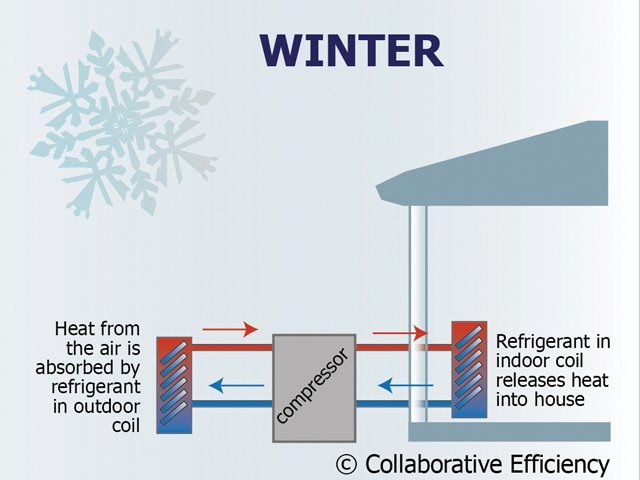Understanding Heat Pumps in Winter: How Do They Work?


(adsbygoogle = window.adsbygoogle || []).push({});
Table of Contents
Introduction to Heat Pumps in Winter
Heat pumps are increasingly popular due to their energy efficiency and dual functionality as both heaters and coolers. However, many wonders, “How do heat pumps work in winter?” Considering that heat pumps extract heat from the outside air, it seems paradoxical for them to function effectively in colder conditions. Linquip is here to unravel this mystery and provide insights on enhancing your heat pump’s winter performance.
How Do Heat Pumps Work in Winter?
Heat pumps operate on the principle of heat transfer. They extract heat from one place and transfer it to another. Even in winter, outdoor air still contains some heat. A heat pump’s job is to extract this heat and transfer it inside to warm your home.
Here’s a simplified process of how heat pumps work in winter:
- Evaporation: The heat pump’s outdoor unit contains a refrigerant. This refrigerant absorbs heat from the outside air and evaporates.
- Compression: The now gaseous refrigerant is compressed, raising its temperature.
- Condensation: The hot refrigerant flows through the indoor coil, where it releases heat, warming up your home. The refrigerant condenses back into a liquid.
- Expansion: The refrigerant passes through an expansion valve, reducing its pressure and temperature, before returning to the outdoor unit.
In extremely cold conditions, when there isn’t enough heat in the outdoor air, heat pumps have auxiliary heating systems to provide supplemental heat.
Enhancing Heat Pump Performance in Winter
While heat pumps can operate efficiently even in freezing conditions, there are ways to enhance their performance:
- Regular Maintenance: Regular servicing can ensure your heat pump operates efficiently, even in harsh winter conditions.
- Proper Insulation: Proper insulation in your home can reduce heat loss, helping the heat pump maintain a comfortable indoor temperature.
- Optimal Thermostat Settings: Avoid setting the thermostat too high as it can engage the auxiliary heating system unnecessarily, increasing energy consumption.
- Protect the Outdoor Unit: Keep the outdoor unit clear of snow and ice to ensure unrestricted airflow and efficient operation.
Conclusion and Final Thoughts
Understanding how heat pumps work in winter can give you confidence in their ability to provide comfort, even in freezing conditions. It’s also key to knowing how to optimize their performance for maximum energy efficiency.
At Linquip, we aim to clarify complex processes and make the world of heating and cooling systems more comprehensible. Trust Linquip to guide you through understanding and managing your home’s heating system. Whether you’re looking for insights on heat pumps, tips to enhance their performance, or general advice on heating and cooling systems, Linquip is your go-to resource.
Step into the world of heat pumps and other home systems with confidence, knowing Linquip is here to guide you. At Linquip, we believe in empowering you with knowledge, and we’re committed to being your trusted partner in all heating and cooling matters.
| Step | Description |
|---|---|
| Evaporation | The heat pump’s outdoor unit contains a refrigerant that absorbs heat from the outside air and evaporates. |
| Compression | The now gaseous refrigerant is compressed, which raises its temperature. |
| Condensation | The hot refrigerant flows through the indoor coil, where it releases heat to warm your home. The refrigerant condenses back into a liquid during this process. |
| Expansion | The refrigerant passes through an expansion valve, reducing its pressure and temperature, before returning to the outdoor unit to repeat the cycle. |
And here’s another table providing tips on enhancing heat pump performance in winter:
| Tip | Description |
|---|---|
| Regular Maintenance | Regular servicing can ensure your heat pump operates efficiently, even in harsh winter conditions. |
| Proper Insulation | Proper insulation in your home can reduce heat loss, helping the heat pump maintain a comfortable indoor temperature. |
| Optimal Thermostat Settings | Avoid setting the thermostat too high as it can engage the auxiliary heating system unnecessarily, increasing energy consumption. |
| Protect the Outdoor Unit | Keep the outdoor unit clear of snow and ice to ensure unrestricted airflow and efficient operation. |
These tables provide a simplified overview of how heat pumps work in winter and how to optimize their performance. For a more detailed understanding, it’s advisable to consult a professional or refer to your heat pump’s specific manual.
Download PDF for Understanding Heat Pumps in Winter
You can download the PDF format of this post from the link provided here.
Buy Equipment or Ask for a Service
By using Linquip RFQ Service, you can expect to receive quotations from various suppliers across multiple industries and regions.
Click Here to Request a Quotation From Suppliers and Service Providers
Read More on Linquip
- 3 Types of Heat Pump + Working Principle ( Clear Guide)
- 16 Parts of Heat Pump and Functions (Clear Guide)
- Heat Pump Efficiency: Equation & Formula
- How Does a Heat Pump Work?
- What Temperature is a Heat Pump Not Effective? Easy Answer
- 5 Best Mini Split Heat Pump for Cold Weather
- What Are Air Source Heat Pumps? A Complete Guide
- Delving Deep into Submersible Well Pumps: How Do They Work?
